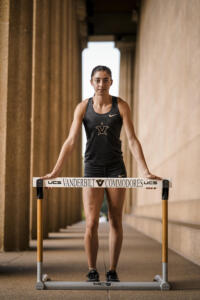Gateway to Paris
by Graham HaysVanderbilt helped Canadian hurdler Brooke Overholt find a route from a small town to the cusp of the Paris Olympics
NASHVILLE, Tenn. — As a teenager in St. Marys, Ontario, Brooke Overholt watched from afar as Canadian runner Sage Watson advanced to 400-meter hurdles semifinals in the 2016 Olympics. Home to fewer than 10,000 residents and the Canadian Baseball Hall of Fame, which isn’t on quite the same scale as Cooperstown, St. Marys is far from the center of the sporting universe. But there on television was someone like her, from the not-much-more-bustling city of Medicine Hat, Alberta, running with the best in the world in Rio de Janeiro.
 Years before, Overholt had boldly declared she wanted to be an Olympian. But at 6 or 7 years old, the assertion was less a plan of action than a reaction to the quadrennial spectacle’s glitz and glamor. She wanted to be an Olympian the way other kids wanted to be astronauts or prime minister. As Overholt, by 2016 a hurdler herself, watched Watson, the Olympics were no longer the stuff of fantasy. They were real. They were attainable.
Years before, Overholt had boldly declared she wanted to be an Olympian. But at 6 or 7 years old, the assertion was less a plan of action than a reaction to the quadrennial spectacle’s glitz and glamor. She wanted to be an Olympian the way other kids wanted to be astronauts or prime minister. As Overholt, by 2016 a hurdler herself, watched Watson, the Olympics were no longer the stuff of fantasy. They were real. They were attainable.
All she had to do was figure out how to get from St. Marys to Paris, site of the 2024 Olympics.
Nashville might seem an indirect route. But for Overholt, like so many alumni, Vanderbilt turned out to be an important stop on the way to where she wanted to go.
While earning a master’s in human development studies as a graduate transfer from Cornell, Overholt pursued the equivalent of graduate studies in track and field at Vanderbilt. Running for cross country and track and field director Althea Thomas’ program meant competing in the SEC—a conference that produced 27 medal-winning performances in the delayed 2020 Tokyo Olympics. Now, with a resumé that includes a fourth place finish in the 2023 NCAA Outdoor Track and Field Championships and qualifying for the 2023 World Athletics Championships, Overholt is on the precipice of reaching Paris as the Canadian Olympic trials get underway in Montreal.
“Coming to Vanderbilt pushed me—on and off the track,” Overholt said. “I had a great experience in my master’s program, and then also being in the SEC really challenged me.
“Running in the SEC final is just as difficult as running in the NCAA final. It’s a very competitive environment, which pushed me to be the best that I can be. It was eye opening in the best way. I truly loved my time at Cornell and being in the Ivy League, but the SEC was a very different athletic experience. I’m grateful because it pushed me to reach that world-class level.”
World-class excellence wasn’t the goal when track and field journey began in St Marys. She just wanted to win her elementary school class’s field day. Then she kept winning, which seemed like good reason to keep running. But it wasn’t until a friend suggested she try hurdles in her first year of high school that she found the event that would take her around the world. The hurdles test mind and body—requiring speed, technical precision and sheer willpower by the end of a race. They aren’t for everyone. But as was the case for her head coach at Vanderbilt, who ran the 400 hurdles as a student-athlete, the race’s unique demands appeal to the sort of personality that craves a challenge.
“I definitely love running the 400 hurdles a lot more than running an open 400,” said Overholt, who nonetheless helped Vanderbilt set records in the 4×400 relay as well.
A year after watching Watson in the Rio Olympics, Overholt made her first foray far from home—relatively speaking—when she represented her province in an under-18 event in Manitoba. She went on to make her first national team and international trip when she competed in the 2019 Pan American U20 Athletics Championships in Costa Rica. But in daring to look beyond her immediate and comfortable surroundings, the trip to Manitoba, without parents or even her regular coach on hand, was a turning point.
“That was good for me, that I still felt comfortable,” Overholt said. “I didn’t feel nervous or homesick. … I think that made me realize that I did want to go to the U.S. and compete in the NCAA. So that was a good stepping stone for me.”
Staying in Canada for university would have necessitated working around limitations in her athletic training environment. For one thing, there is no official outdoor season in Canadian intercollegiate track and field—a problem for someone whose primary event is only run outdoors. There is also greater depth of competition in the United States.
Overholt set a personal best when she broke 60 seconds in the 400 hurdles as a freshman at Cornell. Had she run that time in club meets in Canada, she would have had few challengers—and less motivation to go even faster. In the United States, she barely cracked the top 50 in the NCAA rankings with that time. To finish fourth in the nation last year, she had to run a 55.50.
“There are just so many other girls who are running that fast,” Overholt said of her freshman time. “So it really pushed me to get to the top to make it to NCAA regionals and the finals.”
No. 4️⃣ in the NCAA.🤯
Brooke Overholt ran a personal-best time of 55.50 seconds in the 400-meter hurdles to finish fourth!#AnchorDown pic.twitter.com/UFLYG64ziD
— Vanderbilt XC • Track & Field (@vandyxctrack) June 11, 2023
The same willingness to step into the unknown in search of a challenge soon led her to Vanderbilt. Along with Cornell classmate Beatrice Juskeviciute, transferring to Vanderbilt allowed Overholt to continue training with Justin Byron, a rising star in the coaching ranks whom Thomas brought onto her coaching staff in 2021. Through her master’s program, Vanderbilt offered Overhold the same sort of academic challenge she’d found in the Ivy League. Athletically, it was everything she needed to keep growing. And after several winters in the Finger Lakes, well, Nashville weather had significant appeal.
“It’s a great place to be a track and field athlete, and especially a 400-meter hurdler who needs to be training outdoors,” Overholt said. “I’m able to get outdoors a lot earlier than I was in Ithaca or at home.”
At Vanderbilt, she was part of relay teams that set school records in the indoor and outdoor 4×400-meter relay. She is second in school history in the 400 hurdles, trailing only Ryan Tolbert—who in 1997 became the school’s first individual national champion in any sport.
Overholt stayed in Nashville this past year, welcomed by Thomas as she and Juskeviciute continued training with Byron. At the end of June, she will compete in the Canadian Olympic Track and Field Trials in Montreal. There are multiple paths to Paris, with the most straightforward involving running the Olympic standard (54.85) at some point this year and then finishing in the top three at the Canadian trials.
Eight years after watching Watson run in Rio and seeing what might be possible for a girl from St. Marys, she’s within tenths of a second of completing her journey to Paris.
Who knows who might be watching when she sets her spikes in the starting blocks in France—watching from a small town somewhere in the prairie or maritime provinces, or Nashville and Middle Tennessee. Who knows what dreams it might inspire in them?
“Being home at Christmas and going back to the club that I trained with when I was in high school, I enjoyed talking to athletes in those different environments,” Overholt said. “I like going back there and showing athletes that, yes, I trained here. I grew up here. It’s showing them that I am from a rural area, too, and so many things are possible when you set your mind to it. Just stick with it. Trust your coaches.
“It’s always good going back home and seeing where you came from.”
All the more when you’ve dared to see how far you can go.

